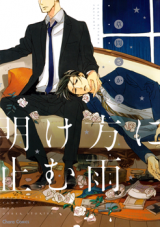The story begins with detective Yuuki investigating what appears to be a straightforward suicide case: Satomura Kousuke, a young man who left behind a spotless apartment, a wiped computer, deleted phone records, and a vague suicide note. Everything points to someone who meticulously put his affairs in order before death.
But Yuuki finds something the police weren't supposed to find—a crumpled note in a trash can that reads: "I was in love with my brother."
Enter Satomura (the older brother), a court clerk who arrives at the scene, devastated and insistent that his younger brother would never commit suicide. What follows is Yuuki's decision to hide the note and help Satomura investigate his brother's death, all while grappling with his own growing feelings for this grieving man.
The brilliance of this manga lies in its gradual revelation of Kousuke's true intentions. On the surface, his suicide appears tragic—a young man in unrequited love with his older brother, unable to bear the pain when he learns his brother is going to an arranged marriage meeting.
But the story peels back layers to reveal something far more sinister: Kousuke's suicide was calculated emotional manipulation: the spotless apartment, the wiped technology, the vague official suicide note, but one incriminating note deliberately left in the trash.
This wasn't carelessness. Kousuke knew his brother's personality—meticulous, fair, thorough. He knew Satomura would check every corner of that apartment. He wanted his brother to find that note. In fact, besides the note that Yuuki had hidden, Satomura did find Kousuke’s planner, while the police couldn’t.
Kousuke didn't just want to die. He wanted to tie his brother down with guilt forever. The message was clear: "I died because I loved you and you were moving on. Now live with that knowledge for the rest of your life."
It's a final act of possession disguised as a love confession—ensuring that even in death, Satomura could never escape him. Every future relationship, every moment of happiness, would be poisoned by the knowledge that his brother killed himself over him.
What makes this story exceptional is Yuuki's role as the unexpected variable in Kousuke's carefully laid trap.
Instead of revealing the truth, Yuuki makes a merciful choice: first he hides the note, then he lies.
He hides the note, which a want-to-be-righteous police officer should never ever do.
He tells Satomura: "Your brother hid it so he wouldn't tie you down."
By rewriting Kousuke's selfish manipulation into noble self-sacrifice, Yuuki frees Satomura from the guilt trap his brother set. It's an act of profound kindness.
Kousuke should have been the romantic hero - the one who loved desperately and tragically. But his method—suicide as emotional blackmail—reveals him as the story's true antagonist.
Yuuki should have been just a side character - a detective doing his job. But his choice to protect Satomura, even through lies, makes him the genuine romantic lead.
Kousuke's love was possessive. Yuuki's love is liberating.
The intimate scene between Yuuki and Satomura is crucial to understanding the story's themes.
Satomura doesn't want sex because he's attracted to Yuuki—he wants it to prove his brother couldn't have done it.
His logic: "If I, a straight man, can have sex with another man, then my brother's homosexuality wasn't a reason to die."
It's self-punishment disguised as investigation. He wants to be hurt because he feels guilty for not knowing his brother's pain.
Instead of giving Satomura the rough, emotionless encounter he's demanding, Yuuki refuses to let him use sex as penance:
"You don't know, do you? What I like—is watching my partner lose control. So I have no intention of rushing."
Yuuki denies Satomura his martyrdom. He won't let Satomura punish himself through mechanical sex. Instead, he forces Satomura to feel pleasure—to be present, to be vulnerable.
This scene is Yuuki's declaration: "I'm not a tool for your self-flagellation. I'm here as someone who wants YOU."
This manga will devastate you—not through melodrama, but through its unflinching portrayal of how love can wound as deeply as it heals.
It's a story about:
- A brother who loved too selfishly to let go
- A detective who loved selflessly enough to lie
- And a man caught between a ghost and a future
The rain stops at dawn. The grief remains. But so does the possibility of something new—messy, imperfect, and achingly alive.
"I'm glad I'm just a stranger."
In the end, that's the manga's thesis: sometimes the greatest love comes not from those bound by blood or history, but from those who choose you freely—and choose to protect you, even from the truth.





